Liberty, February 27, 1926
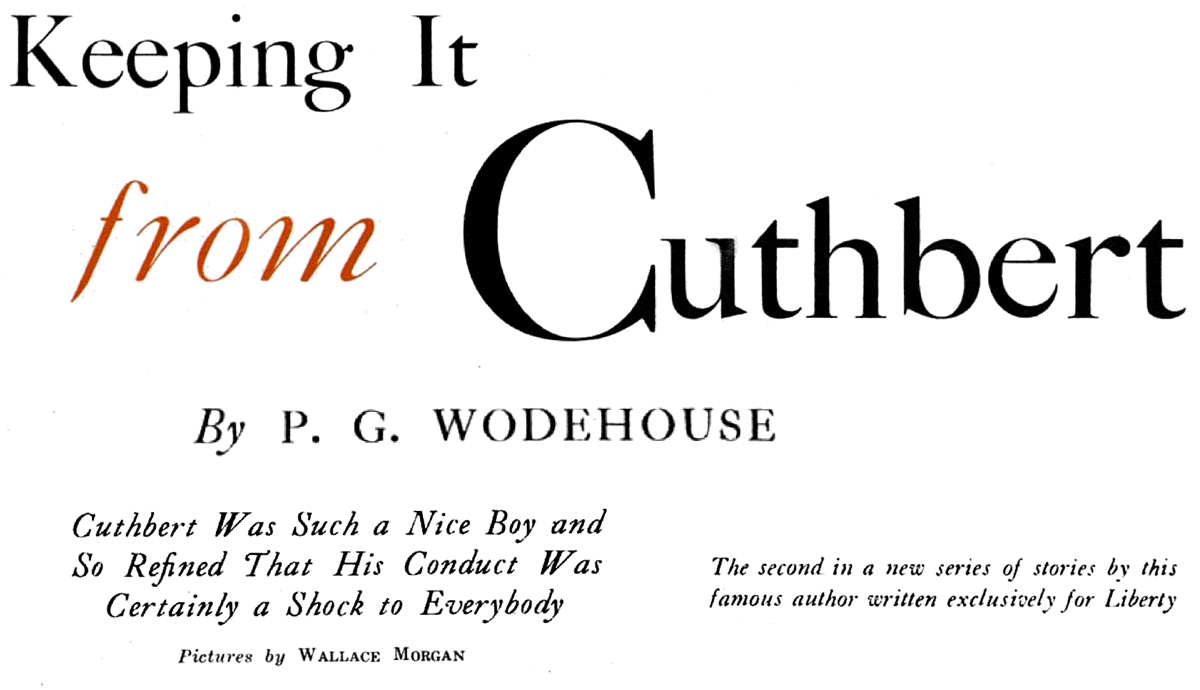
“MA!”
“Yes, dearie?”
Mrs. Bramble looked up, beaming with fat-headed amiability. She was the stupidest woman in South London, and one of the best tempered. A domestic creature, wrapped up in Bill, her husband, and Cuthbert, her son. At the present moment only the latter was with her. He sat on the other side of the table, his lips gravely pursed and his eyes a trifle cloudy behind their spectacles. Before him on the tablecloth lay an open book. His powerful brain was plainly busy.
“Will you hear me my poetry, ma?”
Mrs. Bramble took the book.
“Yes, mother will hear you, precious.”
A slight frown flickered across Cuthbert Bramble’s lofty brow. He disliked his mother’s habit of referring to herself in the third person when in conference with him, as if she were addressing a mere child instead of a young man of ten who knew the Kings of Judah by heart. However, he administered no verbal reproof. He cleared his throat and fixed his eyes upon the chandelier.
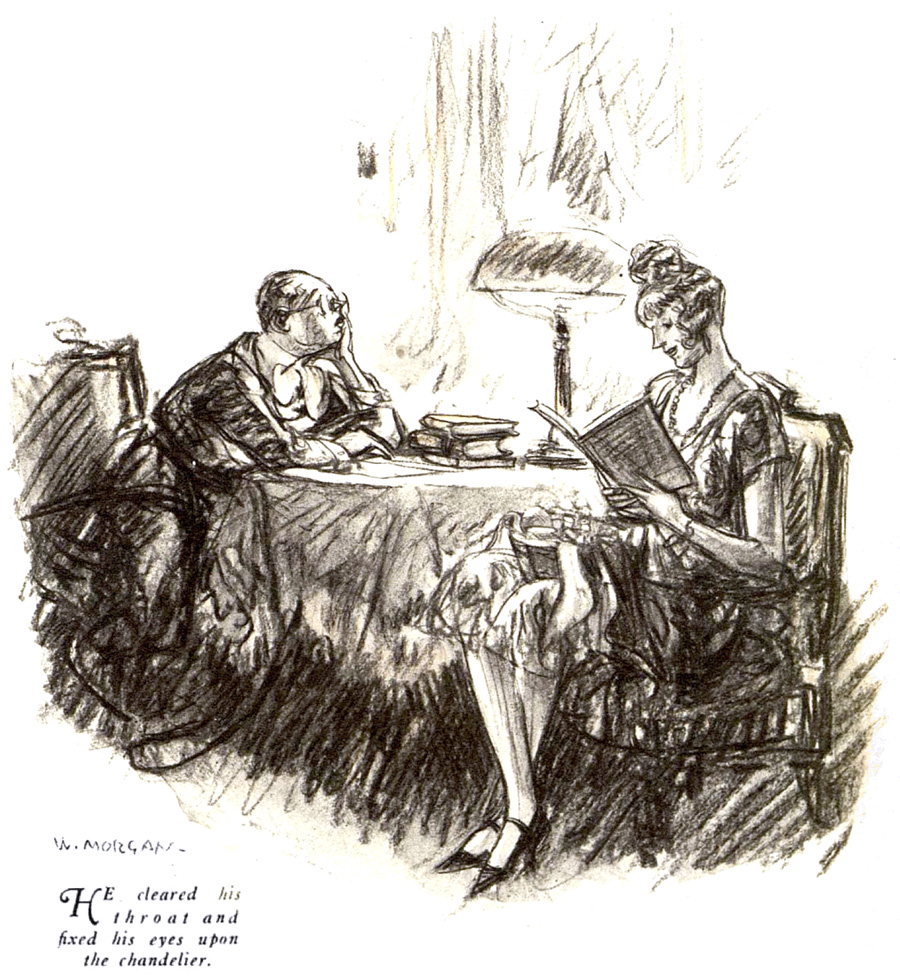
“ ‘Be good, sweet maid,’ ” he began, with the toneless rapidity affected by the young man when reciting poetry, “ ‘and let who will be clever’—clever, oh, yes—‘Do noble things, not dream them’—dream them, oh, yes—‘dream them all day long; And so make life, death, and that vast f’rever, One’—oh, yes—‘grand, sweet song.’ Now I’ll do my Scripture.”
Mrs. Bramble regarded him fondly. A Boy Scout, had one been present, would have been struck by the extraordinary resemblance to a sheep gloating over its young.
“You do study so hard, dearie, you’ll go giving yourself a headache. Why don’t you go for a nice walk for half an hour and come back nice and fresh? It’s a nice evening and you could do your Scripture nicely when you come back.”
The spectacled child considered the suggestion gravely. Then, nodding, he arranged his books in readiness for his return and went out.
The front door closed with a decorous softness.
It was a constant source of amazement to Mrs. Bramble that she should have brought such a prodigy as Cuthbert into the world. He was so different from ordinary children—so devoted to his books, such a model of behavior, so altogether admirable. The only trouble was that this very perfection of his was in a way a drawback, for it had made necessary a series of evasions and even deliberate falsehoods on the part of herself and her husband, highly distasteful to both. They were lovers of truth, but they had realized that there are times when truth must be sacrificed.
AT any cost the facts concerning Mr. Bramble’s profession must be kept from Cuthbert.
When he was a baby it had not mattered. But when he began to move about and take notice, Mrs. Bramble had said to Mr. Bramble, “Bill, we must keep it from Cuthbert.”
A little later, when the boy had taken two prizes at his Sunday-school, the rector, meeting Mr. Bramble one morning, said nervously—for, after all, it was a delicate subject: “Er—Bramble, I think, on the whole, it would be as well to—er—to keep it from Cuthbert.”
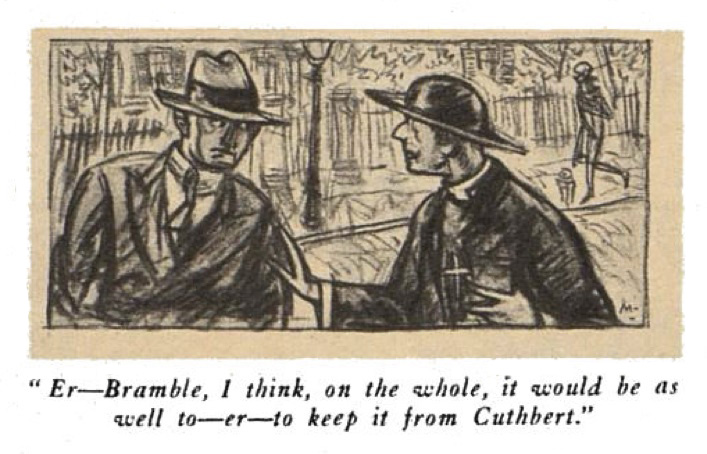
And only the other day Mrs. Bramble’s brother, Major Percy Stokes of the South London Army of Faith, Hope, and Charity, dropping in for a cup of tea, had said: “I hope you’re keeping it from Cuthbert. It’s the least you can do,” and had gone on to make some remarks about men of wrath which, considering that his cheeks were glistening with Mr. Bramble’s buttered toast, were in poor taste. But Percy was like that.
Mr. Bramble had fallen in with the scheme without demur. In private life he was the mildest and most obliging of men and always yielded to everybody. An excellent fellow, whom nobody could help liking. Which made it all the greater pity that his walk in life was of such a nature that it simply had to be kept from Cuthbert.
For the trouble was that William Bramble was a professional pugilist. And, what made it even sadder, a professional pugilist operating under the inelegant pseudonym of Young Porky. You simply can’t go to a boy who has just taken the Junior Scripture prize and tell him a thing like that. It has to be kept from him.
So Cuthbert grew in stature and intelligence without a suspicion of the identity of the square-jawed man with the irregularly shaped nose who shared his red-brick semi-detached home. And time slipped by.
Mrs. Bramble, left alone, resumed work on the sock which she was darning. For the first time since Cuthbert had reached years of intelligence she was easy in her mind about the future.
A week from tonight would see the end of all her anxieties. On that day Bill would fight his last fight, the twenty-round contest with the Frenchman, Dubois, for which he was now training at the Ship and Anchor down the road.
He had promised that it should be his last appearance. He was getting on—thirty-one next birthday; and he very sensibly said that it was better to chuck the game before it chucked him.
His idea was to retire from active work and try for a job as instructor at one of these big schools or colleges. It seemed to Mrs. Bramble that all might now be considered well. She smiled with placid happiness as she darned her sock.
HER meditations were interrupted by a knock at the front door. Footsteps made themselves heard along the passage. The door opened. The head and shoulders of Major Percy Stokes insinuated themselves into the room.
The Major cocked a mild blue eye at her.
“Cuthbert anywhere about?”
“He’s gone for a nice walk. Whatever brings you here, Percy, so late?”
The representative of the South London Army of Faith, Hope, and Charity made no answer. He withdrew his head. His voice, without, said “All right.” He then reappeared, this time in his entirety, and remained holding the door open. More footsteps in the passage and through the doorway, in a sideways fashion suggestive of a diffident crab, came a short, sturdy, red-headed man with a broken nose and a propitiatory smile, at the sight of whom Mrs. Bramble, dropping her sock, rose as if impelled by powerful machinery.
“Bill!”
Mr. Bramble scratched his head, grinned feebly, and looked for assistance to the Major.
“A brand from the burning,” explained that gentleman.
“That’s right,” said Mr. Bramble. “That’s me.”
“The scales have fallen from his eyes.”
“R!” said Mr. Bramble, obviously pleased at the neat phrase.
“What scales?” demanded Mrs. Bramble, a literal-minded woman. “And what are you doing here, Bill, when you ought to be at the Ship and Anchor, training?”
“That’s just what I’m telling you,” said Percy. “I been wrestling with Bill and I been vouchsafed the victory.”
“You!” exclaimed Mrs. Bramble, with uncomplimentary astonishment, letting her gaze wander over her brother’s weedy form.
“I BEEN vouchsafed the victory,” repeated the Major. “It was ’ard work, but did I falter? No, I did not falter. There were moments when it didn’t seem ’ardly possible I could bring it off, but was I down-’earted? No, I was not down-’earted. I wrote him letters and I sent him tracts. I tried to wrestle with ’im in speech, too, but there was a man of wrath, a son of Belial in a woolen jersey and a derby hat, who come at me, using horrible language, and told me to stand still while he broke my neck and dropped me in the ash-can.”
“Jerry Fisher’s a hard nut,” said Mr. Bramble apologetically.
“After that I kept away. But I wrote the letters and I sent the tracts. Bill, which of the tracts was it that snatched you from the primrose path?”
“It wasn’t so much the tracts, Perce. It was what you wrote about Cuthbert. You see, Jane——”
“Perhaps you’ll kindly allow me to get a word in edgeways, you two,” said Mrs. Bramble with heat. “You can stop talking for half an instant, Percy, if you know how, while Bill tells me what he’s here for when he ought to be at the Ship and Anchor with Mr. Fisher, doing his bit of training.”
Mr. Bramble met her eye and blinked awkwardly.
“I’ve come home, Jane.”
“Glory!” exclaimed the Major. “R! We may be sinful sheep, wandering in the wilderness, but we can all come ’ome. We—”
“Percy, if you don’t keep quiet, I’ll forget I’m your sister and let you have one. What do you mean, Bill, you’ve come home? Isn’t there going to be the fight next week, after all?”
“The fight’s over,” said the Major joyfully. “And Bill ’as won, with me seconding ’im.”
“I’m not going to fight, Jane,” said Mr. Bramble in a small voice.
“You’re not going——!”
“He’s seen the error of his ways,” said Percy the resilient. “That’s what he’s gone and done. At the eleventh hour it has been vouchsafed to me to snatch the brand from the burning. Oh, I have waited for this ’appy moment. I ’ave watched for it. I——”
Mrs. Bramble stared, her heart sinking. She was not an intelligent woman, but she grasped the position of affairs at last, and she told herself that she might have expected something like this.
HER brother’s persuasiveness was a byword. Once he had wrought so successfully with an emotional publican in East Dulwich that the latter had started then and there to give all he had to the poor, beginning with his stock in trade. Seven policemen had almost failed to handle the situation.
“You’re not going to fight? Then how about the money?”
“What’s money?” said the Major scornfully.
“You ought to know,” said Mrs. Bramble. “You’ve borrowed enough of it from me in your time.”
The Major waved a hand in wounded silence. It was true that from time to time a certain amount of dross had passed from her hands to his, but this harping on the fact was indelicate and unsisterly.
“How about the money? Goodness knows, I’ve never liked your profession, Bill, but there’s this to be said for it—it’s earned you good money and made us able to give Cuthbert as good an education as any duke ever had, I’m sure. The money you’d have got for this fight would ’ave let us finish him off proper and give him a better start in life than you or me ever ’ad, and now you let this Percy come over you with his foolish talk, and now I don’t know what will ’appen.”
There was an uncomfortable silence. Even Percy seemed at a loss for speech in this stricken home. Mrs. Bramble began to sob. Mr. Bramble shuffled his feet uncomfortably.
“Talking of Cuthbert,” said Mr. Bramble at length, “that’s really the ’ole thing. That’s really what you might call the gist——”
“Jist,” interpolated the Major.
“Jist,” said Mr. Bramble, “—the jist of the thing. It ’adn’t ’ardly struck me till Perce pointed it out, but this fight with this Dew-boys, being as you might say a kind of national affair, in a way of speaking, might lead to there being a piece about me in the Mail, with a photograph of me. And you know Cuthbert reads his Mail regular. And then, don’t you see, the fat would be in the fire. You see, Jane——”
There was a knock at the door.
A little, ferret-faced man in a woolen sweater and cycling knickerbockers entered, removing as he did so a somewhat battered derby hat.
“BEG pardon, Mrs. Bramble,” he said, “coming in like this. Found the front door on the jar, so came in to ask if you’d ’appened to have seen——”
He broke off and stood staring wildly at the little group.
“I thought so!” he said, and shot through the air toward Percy.
“Jerry!” said Bill.
“Mr. Fisher!” said Mrs. Bramble.
“Be reasonable,” said the Major, diving underneath the table and coming up the other side like a performing seal.
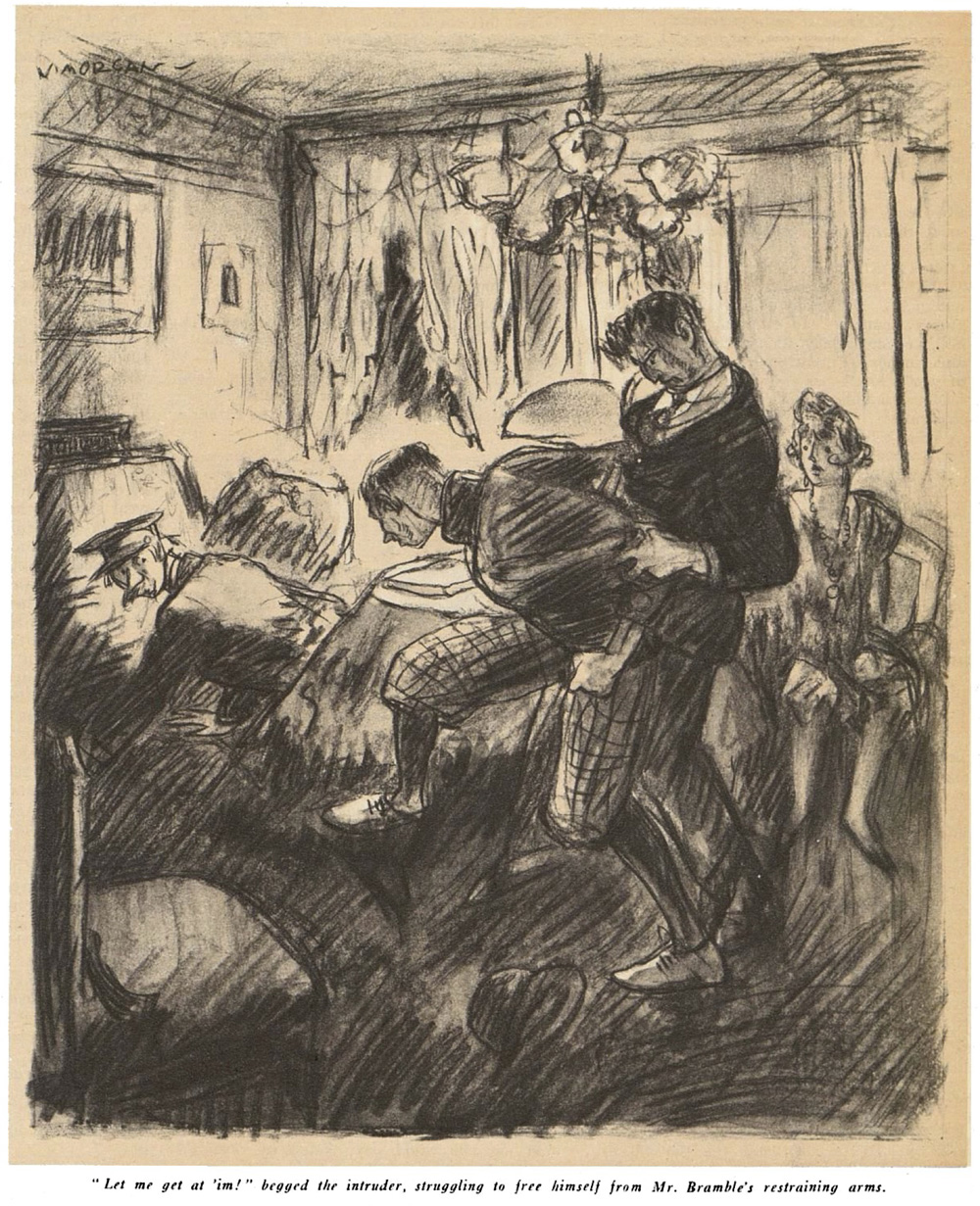
“Let me get at ’im!” begged the intruder, struggling to free himself from Mr. Bramble’s restraining arms.
Mrs. Bramble rapped on the table.
“Kindly remember there’s a lady present, Mr. Fisher.”
“I only want to break ’is neck.”
“Not in my ’ouse,” said Mrs. Bramble. She spoke a little wistfully, for there was much in the scheme that appealed to her.
JERRY FISHER sighed.
“It’s ’ard,” he said. “But I suppose it’s not to be. If you say so, Mrs. B, I suppose I mustn’t put an ’ead on ’im. But it’s ’ard. Bill, you come back along of me to the Ship and Anchor. I’m surprised at you. Ashamed of you, I am.”
Mr. Bramble looked at his brother-in-law miserably.
“You tell him,” he said.
“You tell him, Jane,” said the Major.
“I won’t,” said Mrs. Bramble.
“Tell him what?” asked the puzzled trainer. A sudden thought blanched his face. “You ’aven’t been ’aving a glass of beer, Bill?”
“No, no, Jerry. Not me. It’s only that——”
“Well?”
“It’s only that I’m not going to fight on Monday.”
“What!”
“Bill has seen a sudden bright light,” said Major Percy, edging a few inches to the left, in order to bring the table exactly between the trainer and himself. “At the eleventh hour he has turned from his wicked ways.”
“It’s true, Jerry,” said Bill unhappily. “I been thinking it over, and I’m not going to fight on Monday.”
“Hallelujah!” said the Major tactlessly.
Jerry Fisher’s face was a study in violent emotions.
“I’m sorry, Jerry,” said Bill. “I know it’s hard on you. But I’ve got to think of Cuthbert. This fight with Dew-boys being what you might call a kind of national affair, in a way of speaking, there might be a photograph of me in the Mail, and Cuthbert reads his Mail regular. We’ve been keeping it from ’im all these years that I’m in the profession, and we dursen’t let him know now. He would die of shame, Jerry, if he knew that his father was a leather-pusher.”
Tears appeared in Mr. Fisher’s eyes.
“Bill, you’re off your head. Think of the purse.”
“R!” said Mrs. Bramble.
“Think of all the swells that’s coming to see you. Think of what the paper’ll say. Think of me.”
“I know, Jerry. But Cuthbert?”
“Think of all the trouble you’ve took getting into condition.”
“I know. But Cuth——”
“You can’t not fight on Monday.”
“But Cuthbert, Jerry. He’d die of the disgrace of it. He ain’t like you and me, Jerry. He’s a little gentleman. He sings in the choir, and only the Sunday before last the senior curate patted ’is ’ead. I got to think of Cuthbert.”
“What about me, pa?” said a youthful voice at the door, and Bill’s honest blood froze at the sound. His jaw fell and he goggled dumbly.
There, his spectacles gleaming in the gaslight, his cheeks glowing with the exertion of the nice walk, his eyebrows slightly elevated with surprise, stood Cuthbert in person.
“Hullo, pa! Hullo, Uncle Percy! Somebody’s left the front door open. What were you saying about thinking about me, pa? Ma, will you hear me my piece of poetry again? I think I’ve forgotten it.”
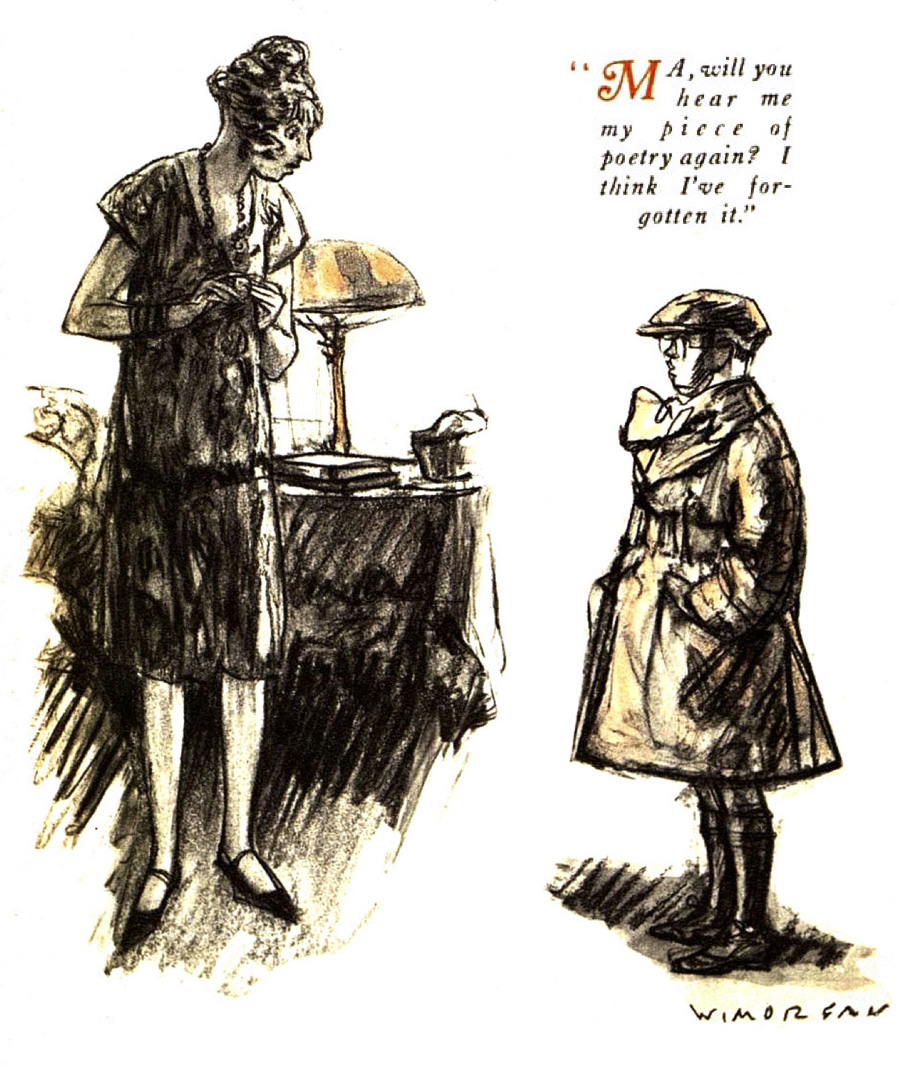
The four adults surveyed the innocent child in silence. On the faces of three of them consternation was written. In the eyes of the fourth, Mr. Fisher, there glittered the nasty, steely expression of the good man wronged who sees his way to getting a bit of his own back.
Mr. Fisher’s was not an unmixedly chivalrous nature. He considered that he had been badly treated, and what he wanted most at the moment was revenge.
“So you’re Cuthbert, are you, Tommy?” he said in a metallic voice. “You’re Cuthbert, are you, that there’s been so much talk about? Then just you listen here a minute.”
“Jerry,” cried Bill, advancing, “you keep your mouth shut, or I’ll dot you one!”
Mr. Fisher’s simple response to the father’s cry was to retreat and grasp a chair. He swung it over his head.
“You better!” he said curtly.
“Mr. Fisher, do be a gentleman,” entreated Mrs. Bramble.
“My dear sir!” There was a crooning winningness in Percy’s voice. “My dear sir, do nothing hasty. Think before you speak. Don’t go and be so silly as to act like a muttonhead. I’d be ashamed to be so spiteful. Respect a father’s feelings.”
“Tommy,” said Mr. Fisher, ignoring them all, “listen to me for ’alf a minute. Do you know what your father is? ’E’s a perfessional fighting man, doing his eight stone four ringside, and known to all the heads as Young Porky. That’s what your father is, Tommy, my boy.”
BILL sank into a chair. He could see Cuthbert’s round eyes staring at him.
“I’d never have thought it of you, Jerry,” he said. “If anyone had of come to me and told me you could have acted so raw, I’d have dotted him one.”
“And if anyone,” retorted Mr. Fisher with spirit, “had of come to me and told me I should live to see the day when you broke training a week before a fight, I’d have given him one for ’imself.”
“Cuthbert, my lad,” said Percy, “you mustn’t think none the worse of your pa for having been a man of wrath. He ’adn’t seen the sudden bright light then. It’s all over now. He’s give it up forever, and there’s no cause for you to feel ashamed.”
Bill seized gratefully on the point.
“That’s right, Cuthbert. I’ve give it up. I was to ’ave fought a Frenchman named Dew-boys at the National next Monday, but I ain’t going to now, not if they come to me on their bended knees; not if the King of England come to me on his bended knees.”
Cuthbert drew a deep breath.
“Oh?” he said shrilly, “Oh, aren’t you? Then, I say, what about my half-crown?”
“Half-crown?”
“The two and a bender I betted a chap at Sunday-school that Dubois wouldn’t last ten rounds.”
He looked round the room wrathfully.
“It’s thick,” he said in the crisp, gentlemanly voice of which his parents were so proud. “It’s jolly thick, that’s what it is. A chap takes the trouble to study form and saves his pocket money to have a bit on a good thing, and then he goes and gets let down like this. It may be funny to you, but I call it thick.
“And another thing, pa. I call it thick you having kept it from me all this time that you were Young Porky. I call that jolly thick.
“There’s a chap at Sunday-school who goes about swanking because he once got Jimmy Wilde’s autograph. Fellows look up to him most awfully, and all the time they might have been doing it to me.
“That’s what makes me madder than a wet hen.
“How long do you suppose the chaps would go on calling me ‘Goggles’ because I have to wear specs, if they knew my father was Young Porky? They’d chuck it tomorrow and look up to me most awfully. I do call it thick.
“And chucking it up like this is the limit. What do you want to do it for? Why, if you beat Dubois, they’ll have to give you the next chance with Sid Sampson for the Lonsdale belt. Dubois beat Ted Richards, and Ted beat the Ginger Nut, and the Ginger Nut only lost to Sid Sampson on a foul, and you beat Ted Richards, so they couldn’t help letting you have next go at Sid.”
THE only person among those present who seemed capable of speech at the close of this harangue was Mr. Fisher. He beamed approval.
“If I’ve told your pa that once, I’ve told him a hundred times. You certainly know a thing or two, Tommy.”
Cuthbert waved the compliment aside deprecatingly.
“Well, of course, I’ve studied form ever since I was a kid,” he said modestly. “All the chaps in our Sunday-school are frightfully keen. One chap’s got a snapshot of Gene Tunney. At least, he says it’s Gene Tunney, but I believe it’s just some ordinary fellow. Anyhow, it’s jolly blurred, so it might be anyone.
“Pa, can’t you give me a picture of yourself boxing, and sign it? I could swank like anything. And you don’t know how sick a chap gets of having chaps call him ‘Goggles.’ ”
“Bill,” said Mr. Fisher, “you and me had better be getting back to the Ship and Anchor.”
Bill rose and followed him to the door without a word.
“Ma!” said Cuthbert.
Mrs. Bramble started convulsively.
“Yes, dearie?”
Cuthbert had seated himself at the table.
The animated expression which had been on his face as he discussed the relative merits of Sid Sampson and the Ginger Nut had given place to the abstracted gravity of the student.
“Will you hear me my poetry, ma?”
Mrs. Bramble took the book.
“Yes, mother will hear you, precious.”
Cuthbert fixed his eyes upon the chandelier.
“ ‘Be good, sweet maid, and let who will be clever’—clever, oh, yes—‘Do noble things——’ ”
the end
Printer’s error corrected above:
Magazine had “Mr. Bramble had fallen in with the scheme with demur.” In the 1913/1914 versions of the story in The Strand and Illustrated Sunday Magazine it was “without demur” and we adopt that reading here.
 Madame Eulalie’s Rare Plums
Madame Eulalie’s Rare Plums